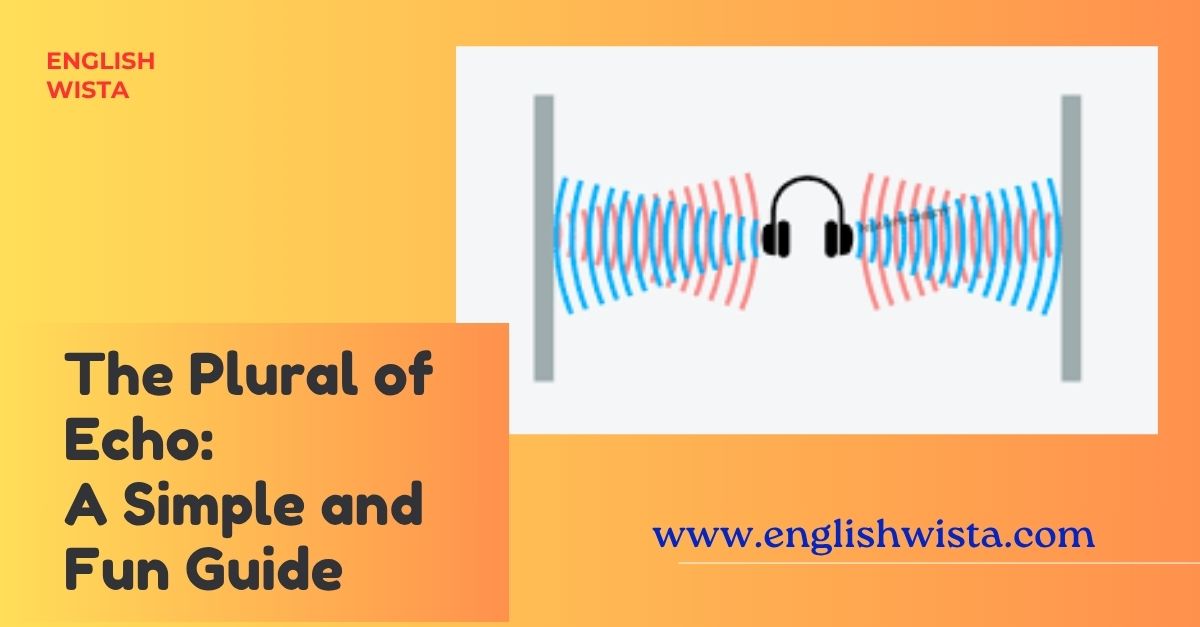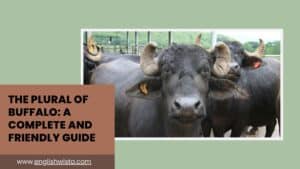Have you ever stood in a big empty room or shouted into the mountains and heard your voice bounce back at you? That repeating sound is called an echo. It’s one of those magical little moments in life that makes you smile. But here’s a question you may not have thought about before: what’s the plural of echo?
It may seem like a small detail, but if you love language or want to use the word correctly in writing, it’s worth understanding. English can be a bit tricky with plurals, especially when it comes to words that don’t just take a simple -s at the end.
Don’t worry, though! In this article, we’re going to break it all down step by step. We’ll explore what “echo” means, the correct plural form, why some people get confused, and how to use it in real-life sentences. Along the way, we’ll add some fun facts to make the journey even more enjoyable.
So, let’s get started and figure out the plural of echo together!
What Does Echo Mean?
Before we dive into the plural, let’s quickly understand the word itself.
Definition of Echo:
An echo is the sound you hear when your voice or another noise bounces off a surface, like a wall or mountain, and comes back to you.
Think of it like sound waves playing a game of “catch.” You throw your words out into the world, and the wall throws them right back at you.
Examples in simple sentences:
- I shouted “hello” into the cave, and the echo came back.
- The empty gym made every sound turn into an echo.
Now that we know what an echo is, let’s answer the big question.
What Is the Plural of Echo?
The plural of echo is echoes.
Yes, that’s right — you add -es to make it plural, not just -s.
So instead of “echos,” the correct spelling is echoes.
Examples in sentences:
- The canyon was filled with echoes of our laughter.
- The singer’s voice created beautiful echoes in the concert hall.
Why Is It “Echoes” and Not “Echos”?
This is where English spelling rules come in. Many nouns that end with -o form their plurals by adding -es instead of just -s.
For example:
- Potato → Potatoes
- Tomato → Tomatoes
- Hero → Heroes
“Echo” follows the same pattern. That’s why it becomes echoes, not “echos.”
However, English can be inconsistent. Some words ending in -o only take -s. For example:
- Piano → Pianos
- Photo → Photos
This mix of rules can make things confusing. But the good news is that once you memorize a few common exceptions, it gets easier.
Is “Echo” Singular or Plural?
This is another common question.
- Echo is singular. It refers to just one repeated sound.
- Echoes is plural. It means more than one repeated sound.
Examples:
- One echo came from the cliff.
- Several echoes filled the valley.
Simple, right? Just remember that singular is echo and plural is echoes.
Examples of Echo vs. Echoes in Sentences
Let’s practice a little more with some everyday sentences.
Singular (echo):
- I heard an echo when I sang loudly.
- The cave produced a strange echo.
- An echo of thunder rolled across the hills.
Plural (echoes):
- The church bells created echoes across the town.
- Our footsteps left soft echoes in the hallway.
- The forest was alive with echoes of birds singing.
Seeing these examples makes it easier to remember the difference.
Where Does the Word “Echo” Come From?
Words often have interesting origins, and “echo” is no exception.
The word comes from Greek mythology. Echo was the name of a mountain nymph who loved to talk. According to the myth, she was cursed only to repeat the last words she heard, which is why we call repeated sounds echoes today.
So, every time you hear an echo, you’re actually hearing a little piece of ancient Greek storytelling. Pretty fascinating, right?
Common Mistakes with the Plural of Echo
Even native English speakers sometimes make mistakes with this word. Here are a few to watch out for:
- Spelling it as “echos.”
- Incorrect: The cave was full of echos.
- Correct: The cave was full of echoes.
- Using the singular form when plural is needed.
- Incorrect: The mountains carried many echo.
- Correct: The mountains carried many echoes.
- Confusing it with other -o words.
Just because “photo” becomes “photos” doesn’t mean “echo” becomes “echos.” They follow different rules.
By keeping these in mind, you’ll avoid common errors.
How Do Other -O Words Compare?
Let’s take a quick look at how “echo” fits with other words ending in -o.
Words that add -es (like echo):
- Hero → Heroes
- Potato → Potatoes
- Volcano → Volcanoes
Words that just add -s:
- Piano → Pianos
- Photo → Photos
- Kangaroo → Kangaroos
So, “echo” belongs in the first group the -es group.
Fun Facts About Echo
Learning about language doesn’t have to be boring. Here are some fun extras about the word “echo”:
- In technology, “echo” is used in programming to mean “repeat” or “display.” For example, in computer code, the command echo often makes the computer show text on the screen.
- In everyday speech, people sometimes say “echo” when they mean something is being repeated, like in the phrase: That statement was an echo of what she said earlier.
- Animals like bats and dolphins use “echolocation,” which is based on the same word. They send out sounds and use the returning echoes to find their way.
Pretty cool, right?
Practical Tips for Remembering the Plural of Echo
If you’re worried about forgetting the correct form, here are a few tricks:
- Think of “hero” and “potato.” They all add -es just like “echo.”
- Say it out loud. “Echoes” just sounds more natural than “echos.”
- Visualize the myth. Imagine the nymph Echo repeating sounds again and again — more than one “echo” means echoes.
The more you connect it with examples or stories, the easier it is to remember.
Quick Recap
Let’s sum up everything we’ve learned so far:
- Echo means a repeated sound.
- The plural of echo is echoes, not “echos.”
- Singular: echo. Plural: echoes.
- Other -o words can follow different rules, so watch out for exceptions.
- Echo has roots in Greek mythology and appears in science and technology today.
Conclusion
So there you have it the plural of echo is echoes. Simple, clear, and easy to use once you know the rule. English may sometimes throw in confusing patterns, but with a little practice and a few memory tricks, you’ll get it right every time.
Next time you’re in the mountains, a cave, or even an empty hallway, listen for those repeating sounds. And now, when you talk about them, you’ll know exactly how to spell and use the word: I heard many echoes.
Language is full of little details like this, and each one makes it richer and more fascinating. Hopefully, this guide helped make things a lot clearer and maybe even a little fun.
Now it’s your turn go out and find some echoes in the real world, and enjoy using your new knowledge with confidence!



